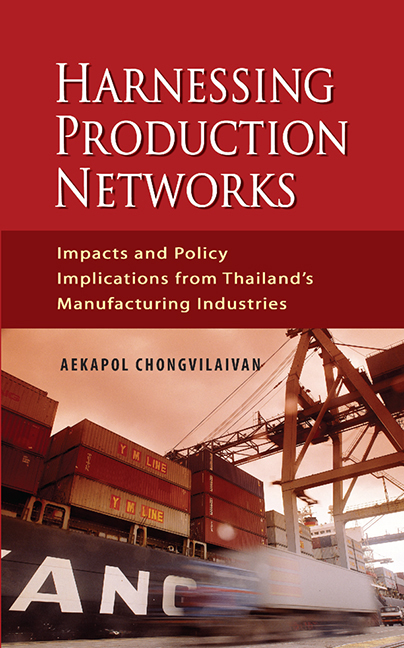 Harnessing Production Networks
Harnessing Production Networks Published online by Cambridge University Press: 21 October 2015
Production fragmentation is a phenomenon of great worldwide interest. Due to technical advances in both production and communication technology, fragmenting and contracting out production of intermediate materials and services have spilled over into the Southeast Asian arena. Even though fragmentation which has become part and parcel of manufacturing production has stimulated keen research interest in its economic consequences, there have been loopholes in the literature. First of all, most existing research on the subject is primarily concerned with the issues related to the industrialized countries. The economic impacts on developing Southeast Asia, however, has received only little attention. Second, despite countless reports on the magnitude and growth of production fragmentation, the distinctive nature of production fragmentation in developing economies like those in the Southeast Asian region makes thorough understandings of its impacts greatly subtle. Last, and perhaps most importantly, the absence of rigorous research is largely attributable to the lack of solid evidence that hallowed a continuous public debate without a strong information base.
This book attempts to bridge these gaps in the existing studies. In contrast with the existing literature, this book provides complete, yet non-technical, analyses of production fragmentation effects and thus targets a wide range of readers — including academics, researchers, policy-makers, students, entrepreneurs, and anyone who is interested in this subject. It investigates the economic impacts of production fragmentation, such as its effects on firms’ performance, wage inequality and skills upgrading in Southeast Asia with a focus on Thailand's experience of emerging as a global hub of fragmentation and outsourcing. This book studies these phenomena from the perspectives of developing countries and thus elucidates new evidence in connection with production, industrial organization and labour economics theories, providing interesting insights for formulating industrialization and labour development policies.
Usual caveats apply. Although a number of issues such as measurement errors, causality problems, potential endogeneity biases, and modest goodness of fit statistics are by all means indispensable, they remain unanswered in my analyses, and therefore my findings should be contemplated as tentative. Tackling these issues requires extensive discussions and analyses and hence may be far beyond the scope of this book. I leave them for the possible avenues of future research.
To save this book to your Kindle, first ensure no-reply@cambridge.org is added to your Approved Personal Document E-mail List under your Personal Document Settings on the Manage Your Content and Devices page of your Amazon account. Then enter the ‘name’ part of your Kindle email address below. Find out more about saving to your Kindle.
Note you can select to save to either the @free.kindle.com or @kindle.com variations. ‘@free.kindle.com’ emails are free but can only be saved to your device when it is connected to wi-fi. ‘@kindle.com’ emails can be delivered even when you are not connected to wi-fi, but note that service fees apply.
Find out more about the Kindle Personal Document Service.
To save content items to your account, please confirm that you agree to abide by our usage policies. If this is the first time you use this feature, you will be asked to authorise Cambridge Core to connect with your account. Find out more about saving content to Dropbox.
To save content items to your account, please confirm that you agree to abide by our usage policies. If this is the first time you use this feature, you will be asked to authorise Cambridge Core to connect with your account. Find out more about saving content to Google Drive.